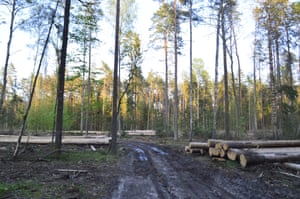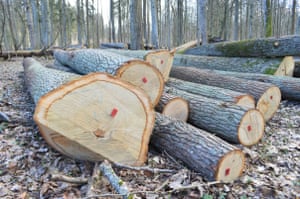Polish government is accused of pushing Białowieża forest ecosystem to point of no return with state-sanctioned logging in Unesco world heritage site
Scientists and environmental campaigners have accused the Polish government of bringing the ecosystem of the Białowieża forest in north-eastern Poland to the “brink of collapse”, one year after a revised forest management plan permitted the trebling of state logging activity and removed a ban on logging in old growth areas.
Large parts of the forest, which spans Poland’s eastern border with Belarus and contains some of Europe’s last remaining primeval woodland, are subject to natural processes not disturbed by direct human intervention.
An Unesco natural world heritage site – the only one in Poland – the forest is home to about 1,070 species of vascular plants, 4,000 species of fungi, more than 10,000 species of insect, 180 breeding bird species and 58 species of mammal, including many species dependent on natural processes and threatened with extinction.
“At some point there will be a collapse, and if and when it happens, it’s gone forever – no amount of money in the universe can bring it back,” said Prof Tomasz Wesołowski, a forest biologist at the University of Wroclaw who has been conducting fieldwork in Białowieża for each of the last 43 years. “With every tree cut, we are closer to this point of no return.”
Logging is prohibited in the Białowieża national park nature reserve, which contains woodland untouched by humans for thousands of years, but the reserve only accounts for 17% of the forest on the Polish side, leaving approximately 40,000 hectares vulnerable to state-sanctioned logging.
On recent visits to the forest, the Guardian encountered evidence of widespread logging of trees in apparent contravention of Polish and European law, including many trees that appeared to be more than 100 years old in Unesco-protected areas, with logs marked for commercial distribution.
“They are logging natural, diverse forest stands which were not planted by humans and replacing them with plantations of trees of a single age and species,” said Adam Bohdan of the Wild Poland Foundation , which monitors logging activity and provides data for scientists working at the Białowieża botanical research station.
“They are logging in Unesco zones where timber harvesting is forbidden, they are logging 100-year-old tree stands in contravention of European law, they are logging during breeding season and destroying habitats occupied by rare species. It is disrupting natural processes which have been continuing there for thousands of years. We are losing large parts of the last natural forest – my worst nightmares are coming true ,” said Bohdan.



No comments:
Post a Comment